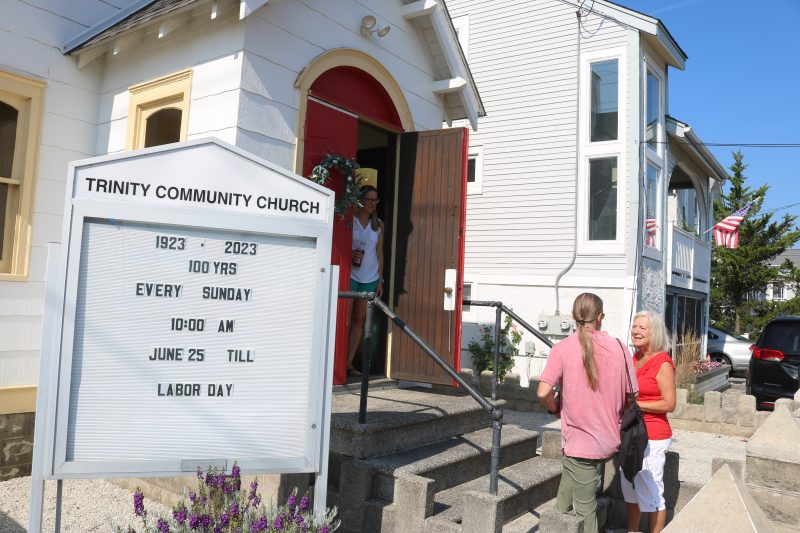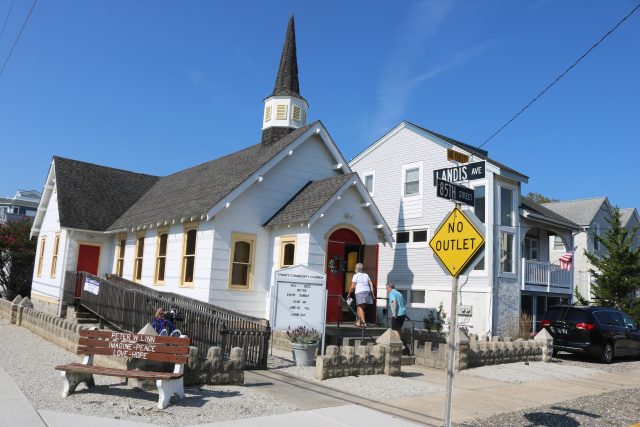
By DONALD WITTKOWSKI
The financial records for Trinity Community Church indicate down to the penny how much it cost to construct the building in 1923 – $2,324.76.
Plus, it cost an extra $500 for the land.
It was a savvy investment by the “Ladies Aid Society” the innocuously named group of women that paid for the quaint church that still stands 100 years later at the corner of 85th Street and Landis Avenue in the Townsends Inlet section of Sea Isle City.
It is remarkable that the church has survived for so long in a seashore town where so many other old buildings that once surrounded it were wiped out by coastal storms or succumbed to redevelopment.
“It is our 100th anniversary,” Pastor Chuck Swanson announced while welcoming parishioners at the start of Sunday morning’s service. “It’s a real exciting time for us to be celebrating our history.”
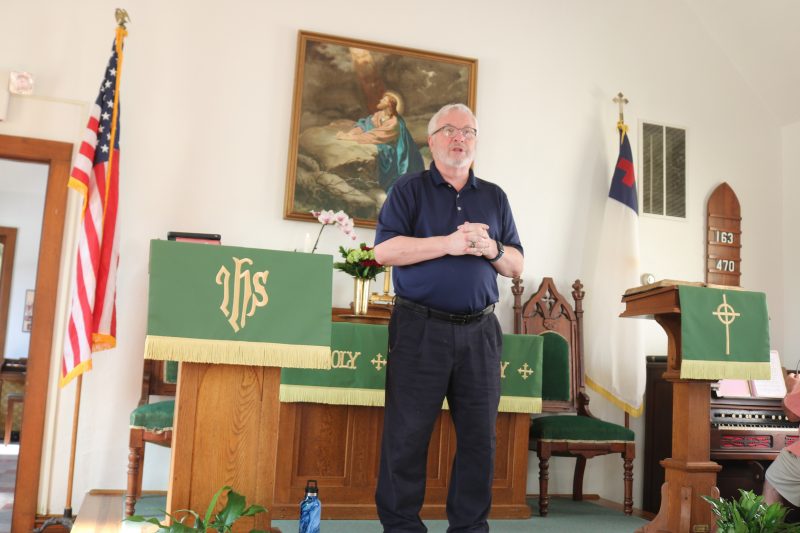
Originally, it was called the Trinity Lutheran Community Church when it opened on July 15, 1923. The original name is written in the old hymn books still used for Sunday services.
The name was changed to Trinity Community Church decades ago, after the Lutherans stopped sending a pastor to Sea Isle. At that time, the church became ecumenical.
Swanson, 67, who has been Trinity’s pastor for 14 years, pointed out that it is common for people of all faiths to join in the church’s summer services. He noted that during one of his sermons, he asked the parishioners to name their denominations and 13 different religions were mentioned.
He believes there are two main reasons for the church’s longevity.
“We preach the Bible, and it’s the truth,” he said. “It’s also the fellowship that people find here. People love this church, because when they walk in the doors, they always find a friend.”
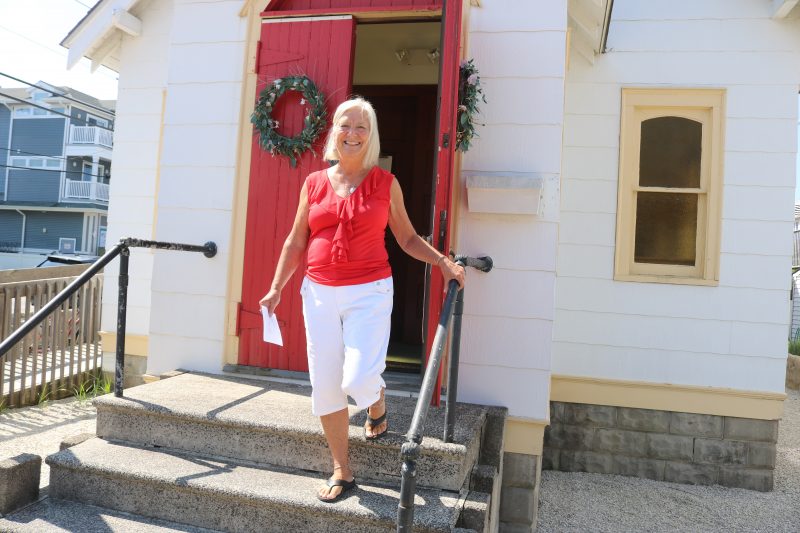
Jeri Musselman, who lives on 85th Street just down the block from the church, said she is amazed by Trinity’s history and the role that the Ladies Aid Society played in its birth, including the group’s bake sales to raise money.
Musselman has been a church member for 17 years. She described her connection with Trinity as deeply spiritual. Moreover, she enjoys the church’s family atmosphere, she explained.
“It just brings me joy,” she said in an interview after the Sunday service. “I love the people here. It’s like family. Even when you meet someone for the first time, it’s a feeling of love.”
Perhaps the church’s biggest advocate over the years has been Lennea McGarr. She formerly served as the church’s caretaker for about 30 years and was the Sunday School teacher when there was still a Sunday School.
“The years went fast,” McGarr said while savoring her fondest memories of the church, including her son’s wedding and her grandson’s baptism at Trinity.
She said it simply made her feel “nice” to have meticulously tended to the church for so long in her role as caretaker.
On Sunday, McGarr smiled while standing next to parishioner Dave Goshow as he ranged the church bell to signal the start of services. Goshow is the husband of Bev Goshow, Trinity’s music director.
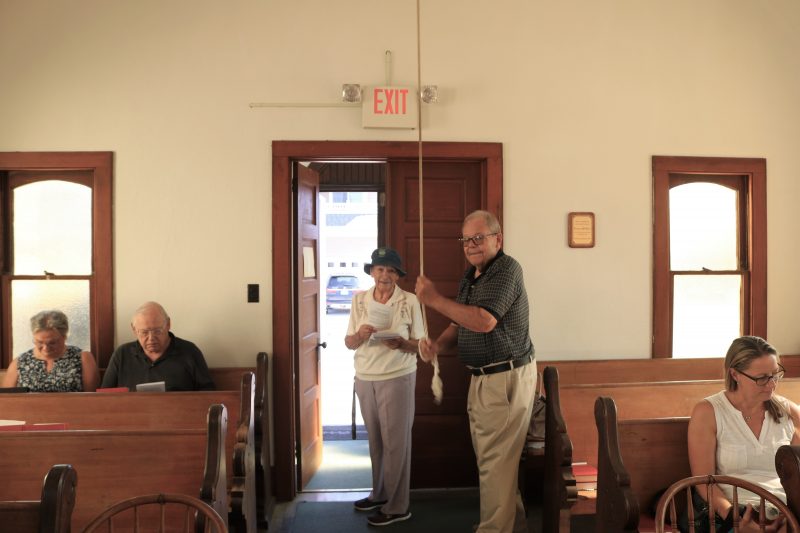
The church holds ecumenical services each Sunday at 10 a.m. through Labor Day weekend and then closes down, as usual, during the quiet off-season months. During the height of the summer tourism season, the church typically attracts 25 to 40 worshippers each Sunday.
Virtually everything is original inside the church, including the eight rows of wooden pews, the altar and the windows.
A portrait of Christ, kneeling in prayer while gazing toward the heavens, adorns the wall behind the altar. Old wooden chairs line the aisle on either side of the pews to accommodate larger crowds. An antique organ and piano fill the sanctuary with music during the singing of hymns.
The church’s architecture is simple and unpretentious. The building’s exterior glistens under a coat of white paint and is topped by a modest steeple. A series of rectangular windows are trimmed in a muted gold color.
Four steps lead from the sidewalk to the red door serving as the main entrance. Surrounding the church is a knee-high, decorative concrete wall that appears as old as the building itself.
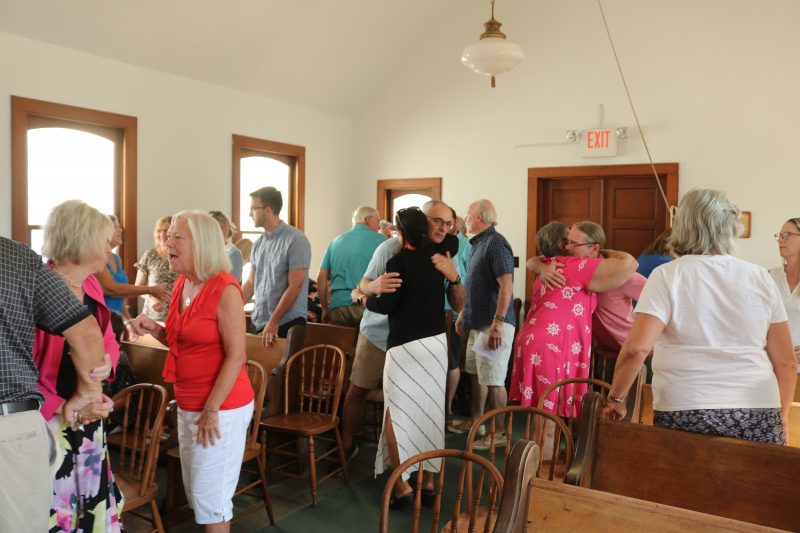
During a period of growth for Trinity, it was decided to expand the building in 1937 for a Sunday School. Swanson told the parishioners that the original construction contract for the expansion was for $1,600.
However, additional costs pushed up the amount to $2,049. Some of the extra costs included $10 for a new window and $6 to paint the steeple, Swanson said, while smiling over what now seems an absurdly low price for that type of work.
The church property is held in a trust set up by the Lutheran Synod of New Jersey, but is owed by the Trinity Community Church corporation, a group controlled by a board of directors comprised of parishioners, Swanson said.
With no mortgage on the building, the church’s main expenses are electricity, the water bill and maintenance costs. The failing air-conditioning system is in need of repair, though.
Swanson said the church’s expenses are paid through donations and offerings from the congregation.
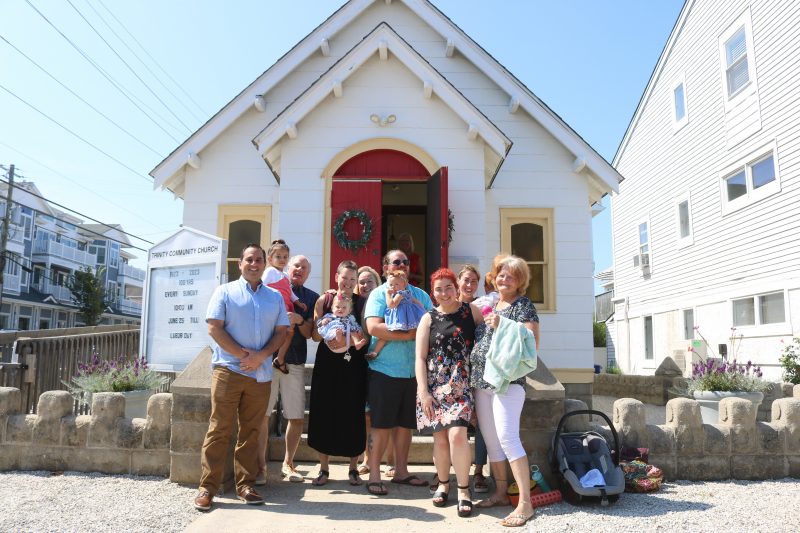
During its 100-year history, Trinity has also become known as “The Little Church in the Inlet.” A hymn called the “Fine Little Church in the Inlet” was inspired by the church and is sung every Sunday by parishioners.
The chorus goes:
There’s a fine little church at the Inlet
No lovelier place at the sea
No spot is more dear to the Christian
Than this dear little church is to me
After surviving for the first 100 years, the church’s future seems secure — perhaps even for another century. The deed to the property stipulates that it must remain a church, protecting it from ever being sold or redeveloped, Swanson noted.
